The top challenge facing merchants trying to managing fraud in 2023 was how to data effectively. Identifying and responding to emerging fraud attacks is now the second most common challenge.
Every industry can benefit from document automation. How? You can boost management, reduce errors, and speed up the workflow.
The Intelligent Document Processing technology can analyze and structure your data. In this article you will find 10 IDP use cases for various industries, including real estate.
What is Intelligent Document Processing?
Intelligent Document Processing (IDP) is a technology that automates manual data entry from paper documents. IDP digitizes data from any documents such as contracts, invoices, bank statements, and more.
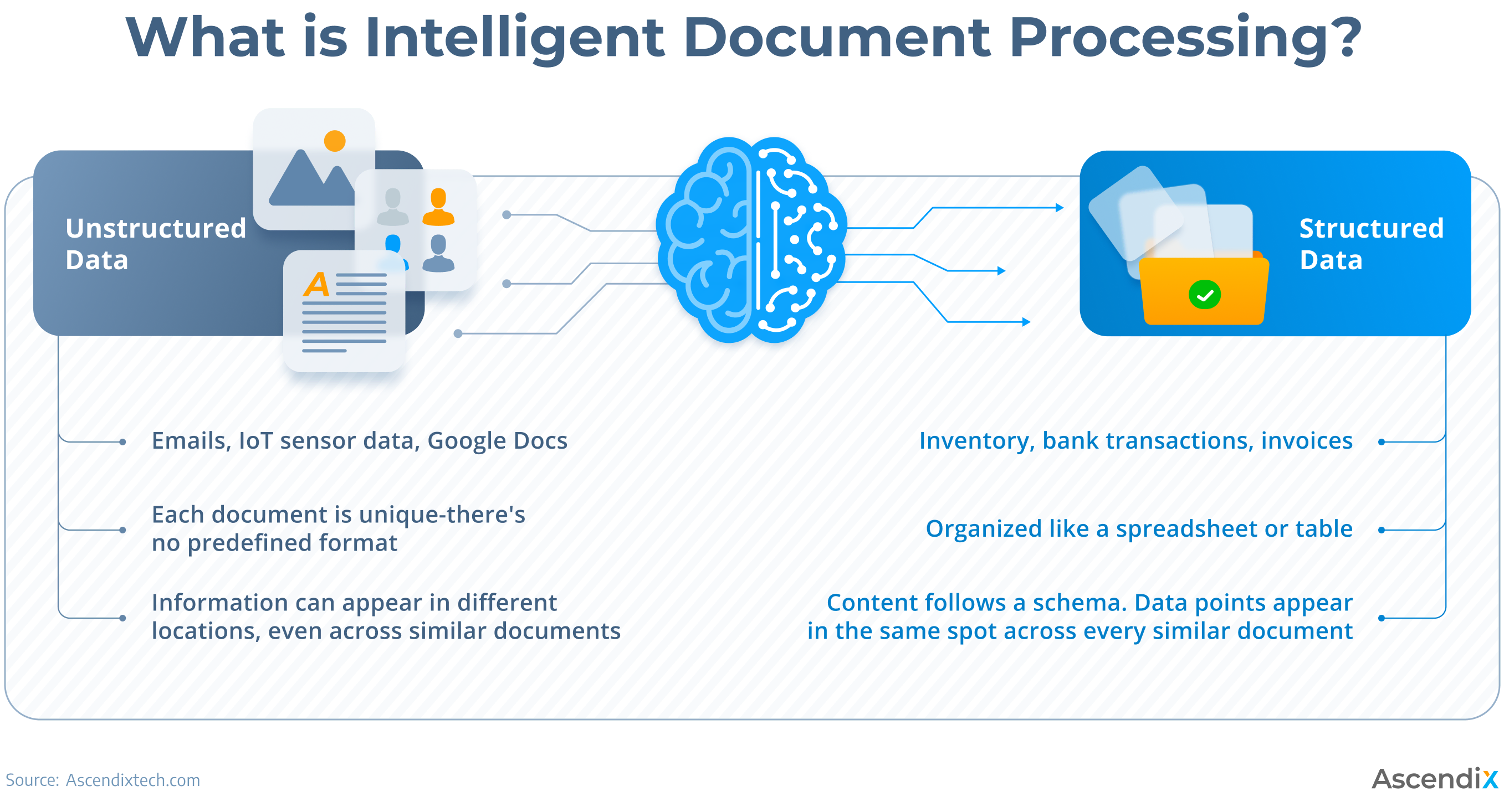
Technically speaking, IDP turns unstructured data into structured. IDP solutions combine AI, machine learning (ML), natural language processing (NLL), and optical character recognition (OCR) to accurately handle all types of documents.
Intelligent Document Processing Use Cases
By 2030 the Intelligent Document Processing market is expected to exceed $12.81 billion. It’s becoming essential for industries like banking, healthcare, and real estate to adopt IDP technology.
Let’s explore some Intelligent Document Processing methods that simplify data handling:
- Invoice automation
- Customer onboarding
- Contract management
- Employee onboarding
- Payroll transactions
- Fraud detection
- Medical records
- Mortgage documents
- Lease abstraction
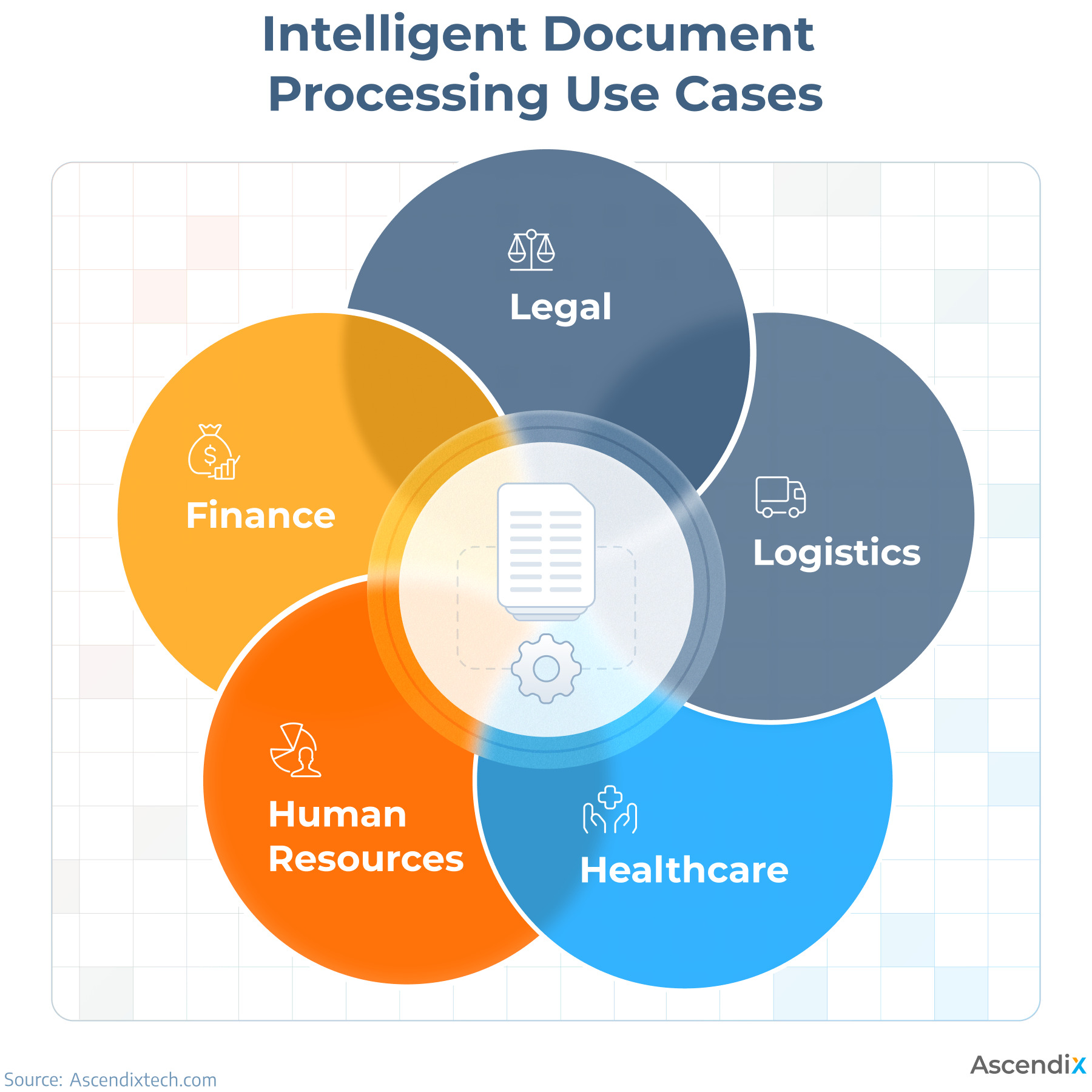
Invoice automation
One of the well-spread IDP use cases in finance is invoice automation. Intelligent Document Processing technology captures the key information from invoices, such as:
- Invoice numbers
- Dates
- Line items
- Vendor and seller information
- Payment terms
IDP structures data, speeds up the extraction workflow, and minimizes human error.
Customer Onboarding
Customer onboarding gets a significant upgrade with Intelligent Document Processing. In industries like banking, healthcare, insurance, and government services, IDP automatically extracts and verifies customer data from documents such as ID cards and application forms.
When onboarding includes handwritten forms and notes, document automation excels. IDP reads and interprets handwriting, even cursive, and fills in missing characters with high precision. Tax documents, patient intake forms, and government applications are easily turned into digital, usable formats with IDP, ensuring efficiency and accuracy in data handling.
Contract Management
IDP simplifies contract management by extracting key data from contracts, such as:
- Business names
- Key dates
- Terms and conditions
Beyond processing existing contracts, IDP can also assist in creating new ones. It ensures language consistency and extracts key terms for inclusion, making contract creation smoother. This is especially useful in industries like legal services and corporate operations. With IDP, maintaining consistent and accurate contracts becomes more efficient and reliable.
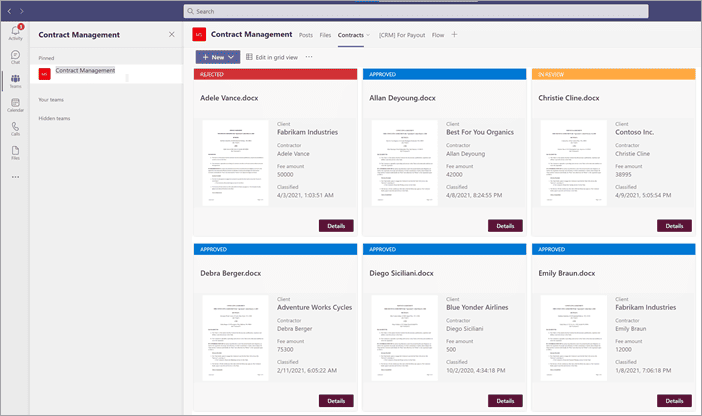
Microsoft 365 for Contract Management
Employee Onboarding
Across various industries, employee onboarding is a fundamental process where IDP plays a pivotal role. By autonomously extracting and verifying data from documents like:
- Proof of address
- Identification papers
- Financial statements
- Employment contracts
- Tax forms
This not only saves time and gives valuable insights into employee behavior and preferences. Additionally, post-onboarding IDP solutions facilitate the creation of comprehensive documentation, user guides, and FAQs, ensuring swift resolution of employee queries.
Payroll Transactions
Payroll processing is a time-consuming and recurring task for organizations. The HR team must manage payroll accurately to ensure timely payments for every employee. This process involves significant data entry efforts, requiring the collection of information from multiple sources, extraction of employee details, and manual processing of transactions, which can lead to errors and delays.
Intelligent Document Processing | Infrrd
IDP automatically ensures the consistency of employee data by validating:
- Timesheets
- Deductions
- Overtime hours
- Tax forms
- Benefits and allowances
By automating end-to-end payroll transactions, IDP eliminates human errors and prevents delays.
Fraud Detection
Managing large volumes of information is a complex task that can lead to various challenges. One significant issue is the potential increase in document fraud cases.
Intelligent Document Processing automates the validation and verification of document records. IDP can automatically flag and annotate problematic transactions for the fraud team by:
- Identifying and flagging suspicious transactions
- Annotating potential fraud cases for further review
- Validating the authenticity of documents
- Cross-referencing transaction records
- Monitoring transaction patterns
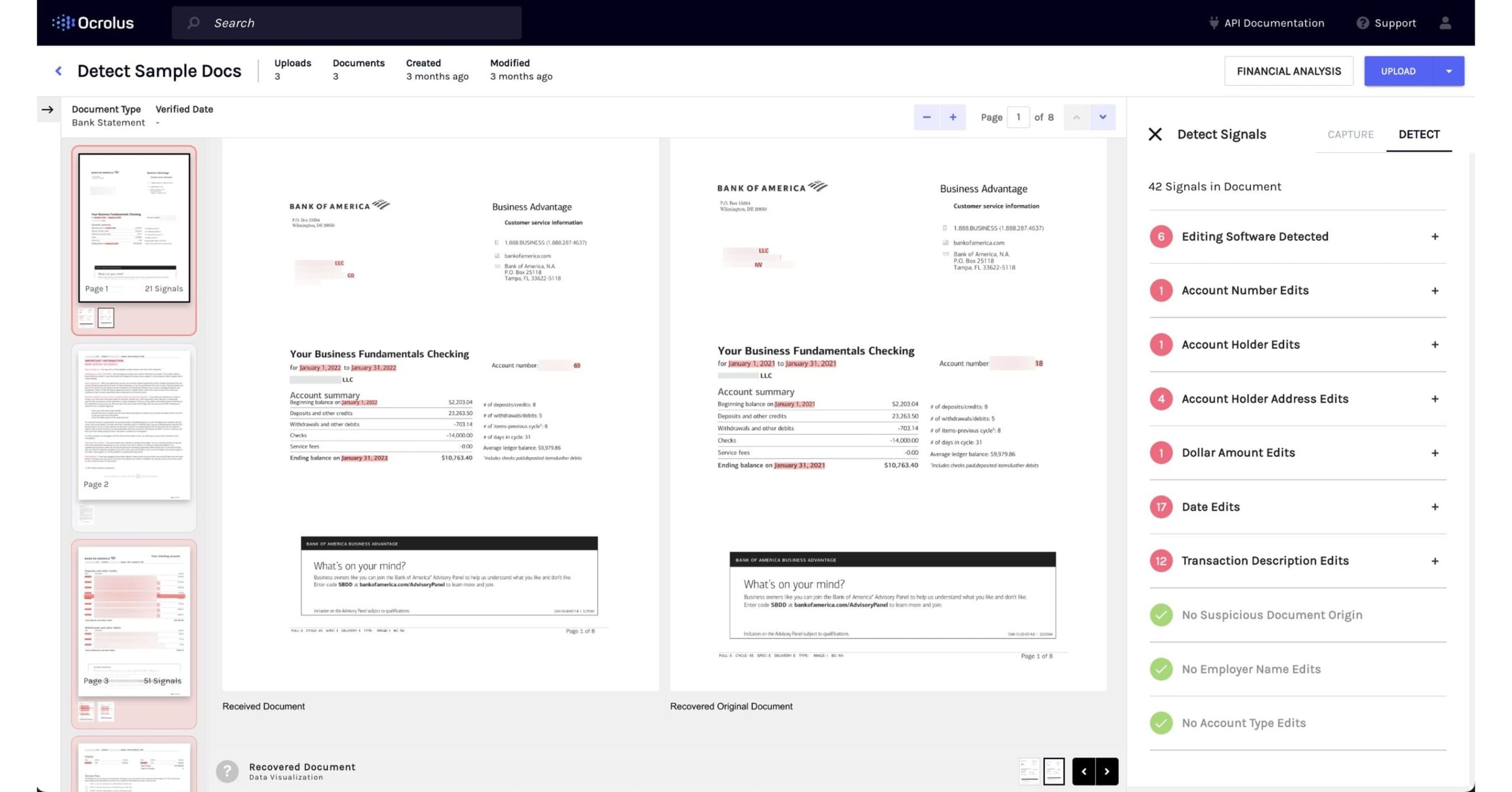
Comprehensive Fraud Detection Solution | Ocrolus
Medical Records
In the healthcare industry, having instant access to medical records is crucial for providing quality service. Automating medical records with Intelligent Document Processing technology can capture and extract data efficiently. IDP offers quick access to necessary information:
- Patient intake forms
- Enrollment documents
- Health insurance claim forms
- Medical history records
- Treatment and procedure documentation
Automation simplifies access and management of medical records, ensuring healthcare professionals have the information they need without delay.
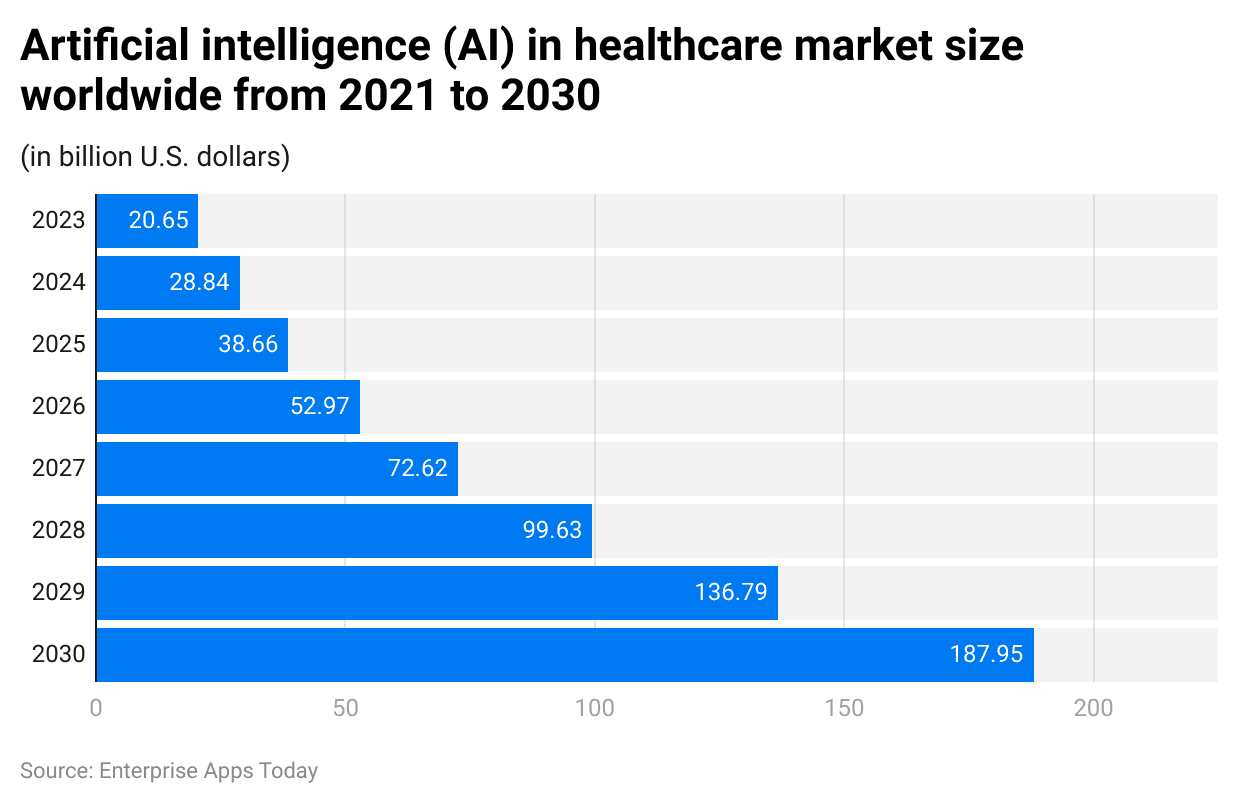
AI in Healthcare Statistics
Delivery Receipts
Automating the processing of delivery receipts allows logistics companies to accurately record delivery information and complete the necessary paperwork promptly.
Key data captured and processed includes:
- Shipment details
- Consignee information
- Delivery date and time
- Signatures
- Condition of goods upon delivery
Intelligent Document Processing ensures accurate and timely completion of delivery records.
Mortgage Documents
Handling large volumes of structured and unstructured mortgage documents makes the process more fragmented. Intelligent document processing reduces operational risks, validates data, and thoroughly audits every application before processing:
- Borrower information
- Application details
- Financial statements
- Property documents
- Legal contracts
Lease Abstraction
Intelligent Document Processing extracts key information from lease agreements:
- Tenant names
- Lease terms
- Rent amounts
- Renewal options
- Maintenance responsibilities
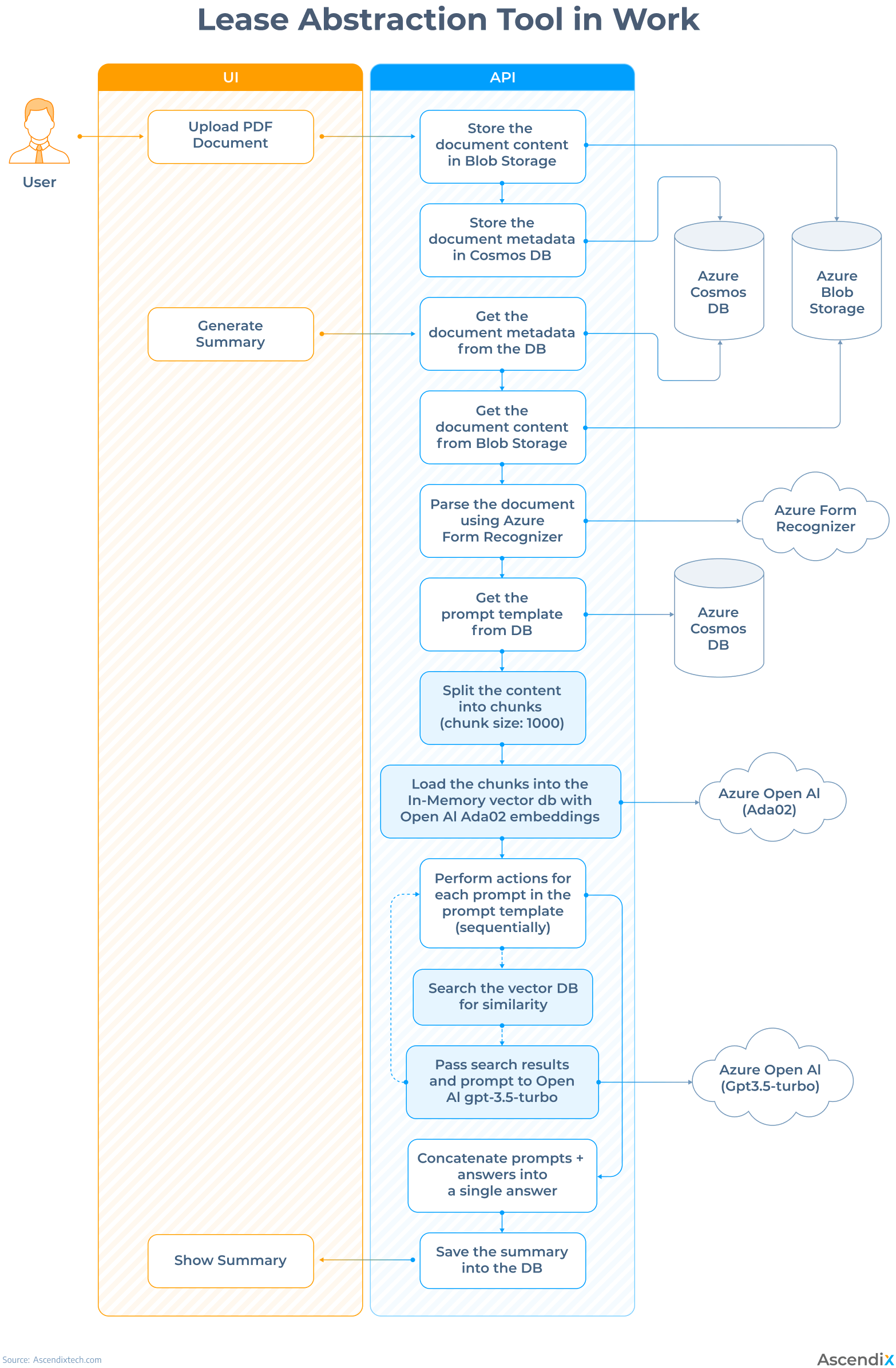
Lease Abstraction Tool in Work
This summarized data is then input directly into a CRM system for easy access and management, streamlining the workflow for brokers and property managers.
Want to Use AI in Your Mortgage Document Workflows?
See how AscendixTech can help you automate mortgage operations with the help of AI.
Intelligent Document Processing in Real Estate
The real estate industry plays a big part in Intelligent Document Processing use cases. Brokers and property managers must deal with loan and lease documents, contracts, market records, and other critical paperwork.
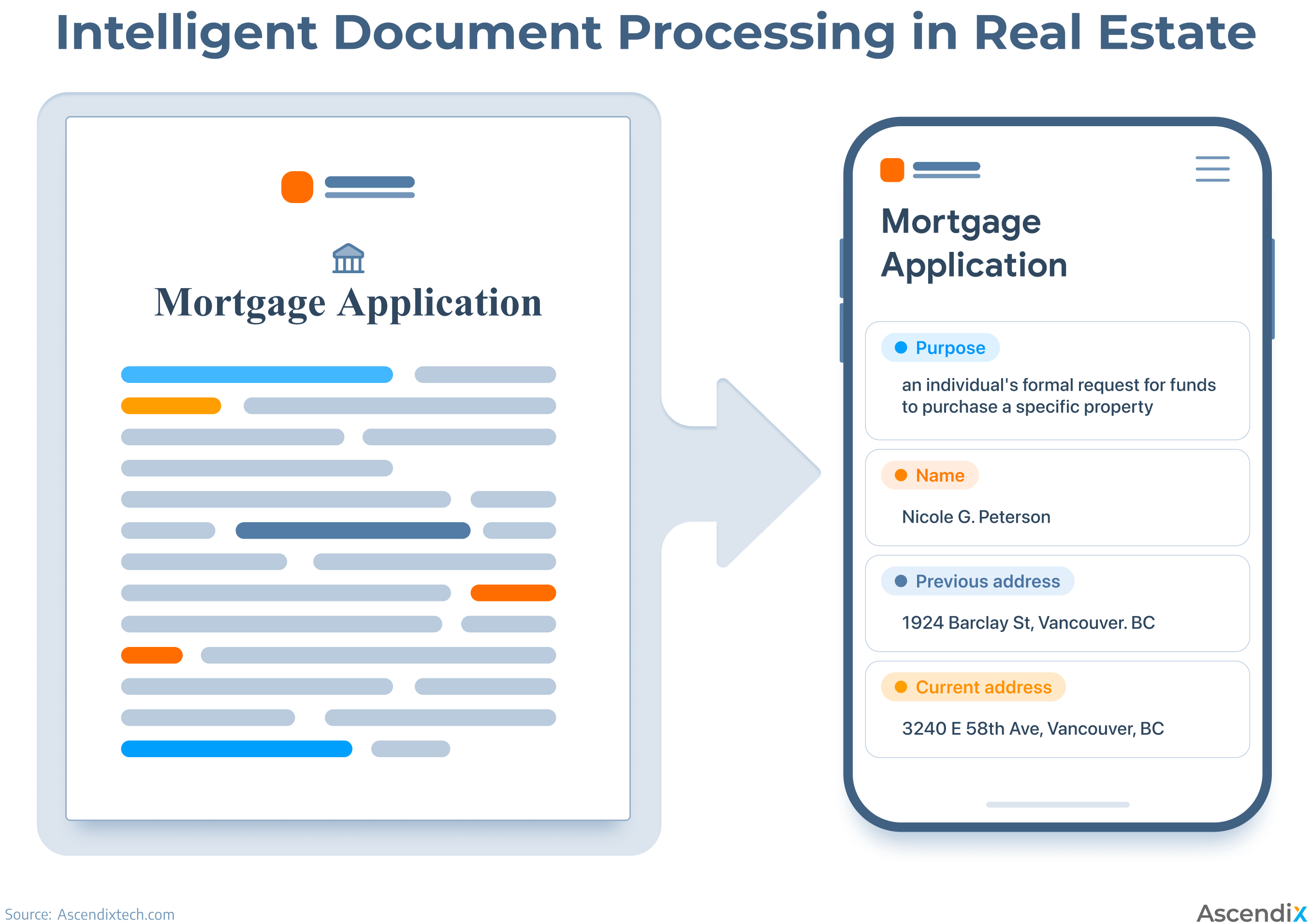
Handwriting Recognition
IDP converts handwritten notes from property inspections or client meetings into digital text. It then summarizes the key points and stores them in a searchable format within the CRM, making it easier to retrieve and utilize important information.
Image and PDF Recognition
IDP extracts text and key data from scanned images or PDF documents, such as property deeds, mortgage documents, or appraisal reports. It summarizes the content and categorizes it for easy retrieval, ensuring that important documents are always accessible and organized.
Document Sorting
IDP can automatically classify and sort various types of real estate documents (e.g., contracts, invoices, property descriptions) based on their content. It organizes these documents into relevant folders or categories within a document management system, enhancing document management efficiency.
Contract Summarization
IDP condenses lengthy contracts, pinpointing essential clauses, deadlines, and obligations. This concise version allows real estate professionals and clients to quickly reference key points, enhancing understanding and efficiency without sifting through extensive documents.
Property Listings
IDP summarizes property listings from multiple sources, extracting critical details like location, price, features, and amenities. It consolidates the information into a standardized format for easy comparison and analysis, aiding in better decision-making.
Meeting Minutes and Summaries
IDP can automatically generate summaries of meeting minutes, highlighting key decisions, action items, and deadlines. These summaries are distributed to relevant stakeholders and stored in the CRM, ensuring everyone is informed and accountable.
Market Reports
IDP summarizes market analysis reports to provide insights into trends, average property prices, and investment opportunities. These summaries inform strategic decision-making and client advice, offering a competitive edge in the market.
Financial Document Summarization
IDP extracts key figures and summaries from financial documents, such as income statements, balance sheets, and cash flow statements. It provides a quick overview of the financial health of properties or real estate portfolios, facilitating better financial management.
Client Communication
IDP summarizes email threads and communication logs with clients to capture important details and follow-up actions. This ensures that all team members are up to date on client interactions and requirements, improving team coordination and client satisfaction.
Need Technology Partner with Experience in Real Estate?
We speak real estate. We’ve been developing software products for real estate for 2 decades. Speak to Ascendix consultant.
Technologies used in Intelligent Document Processing
Intelligent Document Processing leverages a variety of advanced technologies to efficiently handle and process different kinds of documents.
Optical Character Recognition (OCR) converts images of text into machine-readable text formats. It digitalizes paper documents such as forms, receipts, invoices, contracts, and legal documents.
Natural Language Processing (NLP) enables computers to analyze, interpret, and understand human language. It processes text and voice data to analyze sentiment, content, or intent.
Robotic Process Automation (RPA) facilitates the building and deployment of software to automate human actions. RPA software can automate business workflows by recording and replicating the steps a user takes to process a document.
Benefits of Intelligent Document Processing
Intelligent Document Processing offers numerous benefits, enhancing various aspects of business operations.
| Benefit | Description |
|---|---|
| Increased Efficiency | Eliminates manual data entry, speeding up document processing and reducing errors. |
| Enhanced Accuracy | Uses intelligent algorithms to extract and validate data, minimizing human errors and ensuring data integrity. |
| Improved Scalability | Easily handles large volumes of documents, maintaining smooth operations even under high demand. |
| Accelerated Workflows | Automates repetitive tasks, reducing cycle times and improving productivity. |
| Reduced Cost | Lowers costs by minimizing manual labor, allowing resources to focus on strategic tasks. |
| Enhanced Compliance and Security | Provides audit trails and access controls, ensuring regulatory compliance and protecting sensitive information. |
| Insights and Analytics | Extracts data for valuable insights, enabling data-driven decisions and process improvements. |
| Integration with Existing Systems | Seamlessly connects with CRM, ERP, and other systems for smooth data flow and collaboration. |
How Does Intelligent Document Processing Work?
Intelligent Document Processing (IDP) can interpret, classify, and extract data from various types of documents, ranging from structured data to unstructured texts like emails and reports. Here’s an overview of the process:
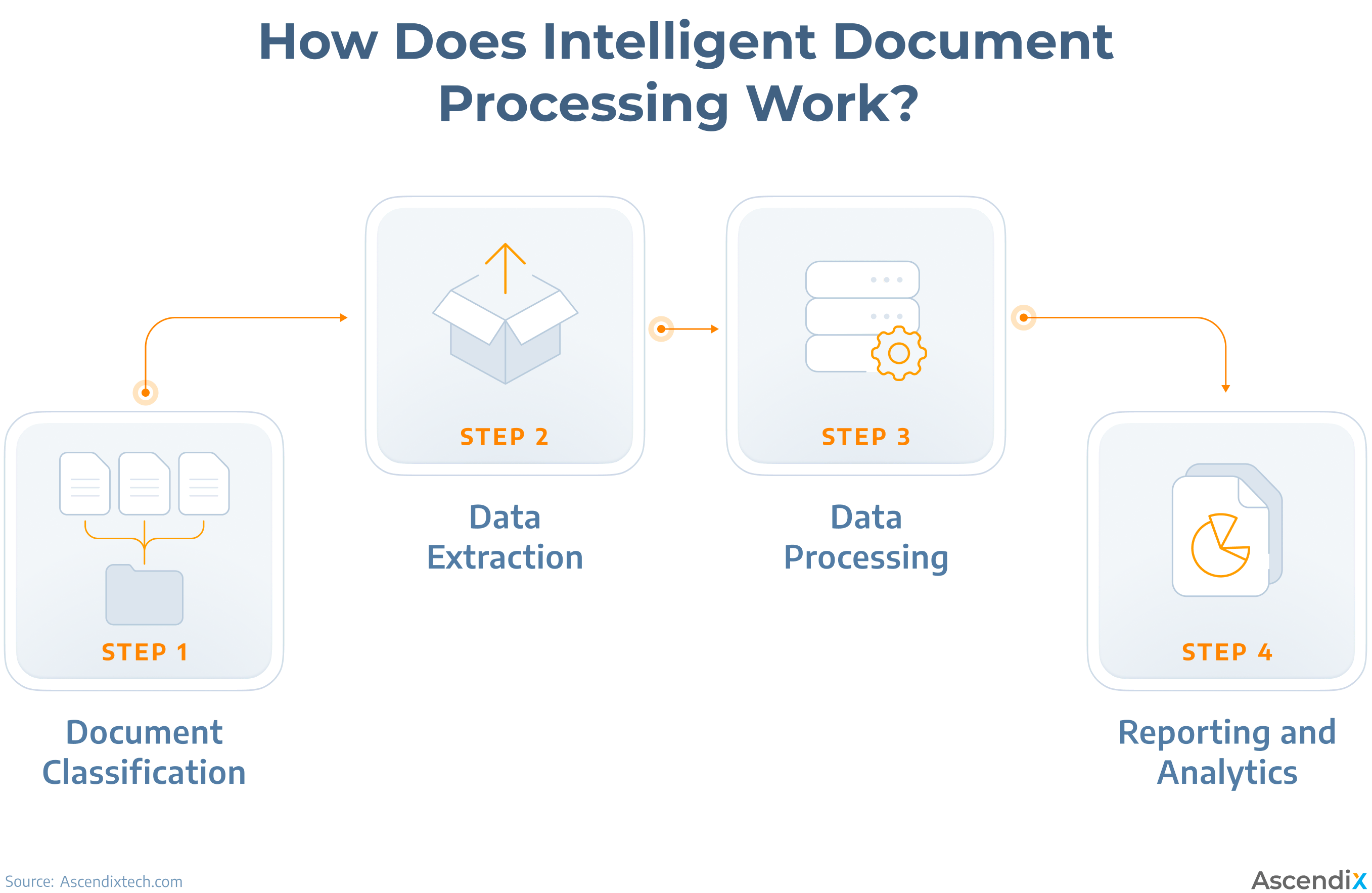
Document Classification
The first step in IDP is capturing and classifying documents. This involves importing both paper and digital documents into the system. AI-powered tools recognize and categorize different types of documents, such as invoices, purchase orders, or legal contracts. This classification is crucial for determining the next steps in processing each document type.
Data Extraction
After classification, the system extracts relevant data from the documents using OCR and NLP. IDP systems accurately identify specific information such as dates, amounts, or names. The system also performs data validation to ensure accuracy, cross-referencing extracted data with existing databases or using predefined rules to check for errors.
Data Processing
Once validated, the extracted data is processed according to its purpose. For instance, invoice data might be routed for payment processing, and contract details could be sent to a legal platform. The IDP system integrates with other business systems, such as ERP and CRM, ensuring seamless data flow and automating actions based on the processed data.
Reporting and Analytics
IDP systems can track metrics such as processing time, error rates, and throughput volumes. These metrics can be further analyzed to derive insights that help identify bottlenecks, improve workflows, and make data-driven decisions for overall efficiency.
Want to Integrate AI into Your Existing Software?
See how AscendixTech can help you optimize your operations and improve your workflow with the help of AI.
Top 5 Intelligent Document Processing Software
Here are a few IDP solutions to consider when you want to up your document management and data extraction:
- Microsoft Syntex: a Microsoft 365 service designed to streamline document processing within SharePoint using intelligent document processing, content AI, and machine learning. It offers pre-trained SharePoint Syntex models, allowing users to automate metadata extraction from document libraries. Microsoft Syntex is ideal for enterprises already using SharePoint.
- Azure Form Recognizer: AI service that caters to teams tasked with processing multiple document types at scale, offering an intelligent document processing solution to streamline data extraction and processing workflows.
- Datakeen: uses IDP to equip companies with intelligent suggested responses for managing customer relationships via Google emails and online reviews. This platform is ideal for small to midsize companies seeking to leverage intelligent document processing alongside AI computer vision tools.
- Rossum: is intended to automate end-to-end business workflows, minimize manual data entry errors, and enhance productivity. The tool offers comprehensive solutions for document pre-processing, validation, post-processing, and reporting.
- Amazon Comprehend: analyzes a wide range of documents, including customer support tickets, product reviews, emails, and social media feeds, extracting text, key phrases, topics, and sentiment.
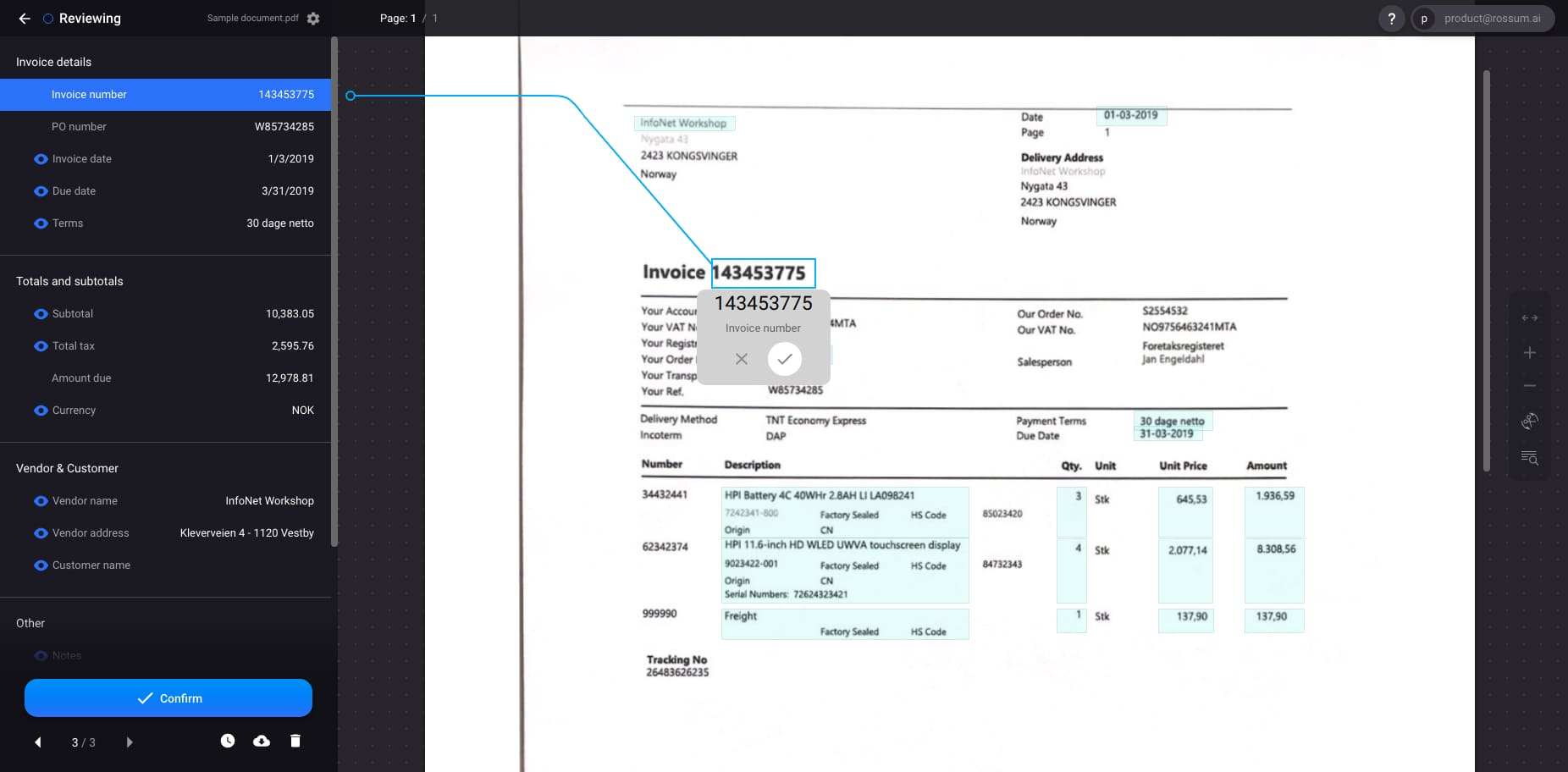
Rossum dashboard
How Can Ascendix Help You Embrace Intelligent Document Processing?
For over two decades, Ascendix has been at the forefront of business automation, with a strong focus on the real estate industry. As AI technology has rapidly evolved, we have specialized in property tech development and created our own contract abstraction framework tailored specifically for real estate businesses. This means you can skip the lengthy development process and avoid relying on generic tools that may not cater to the unique needs of real estate documents.
Why choose Ascendix as your partner for IDP?
- Expertise in Real Estate AI and Software Development: With more than 20 years of experience, we excel at creating high-quality, customized software solutions for various industries, including real estate. Our custom AI tools are designed specifically for the property sector.
- Collaboration with Industry Leaders: We have established partnerships with major real estate players like JLL, as well as over 300 clients worldwide. Together, we develop tailored software solutions that meet their specific business requirements.
- Global Reach and Insights: With five worldwide offices, we leverage our international presence to access diverse skills and knowledge. Our US-based operations, combined with European outsourcing, allow us to incorporate global trends and demands into our solutions, ensuring they meet the highest standards.
How Ascendix can help you in Intelligent Document Processing:
- Customized AI Tool Development: We offer tailored real estate AI solutions, including custom AI data entry automation tools, designed to seamlessly fit your business needs.
- Seamless Integration: We can integrate new or existing AI tools into your business workflows, ensuring a smooth transition and maintaining data synchronization across all platforms.
- Expert Consultancy: Our team of specialists can guide you in selecting the most suitable AI solution for your business, guaranteeing it aligns with your unique requirements.
- Comprehensive Audits: Ascendix provides thorough audits of existing AI tools and can enhance them with additional features or artificial intelligence capabilities upon request.
Book a free consultation today to explore how we can help you automate your Intelligent Document Processing.
Entrust Your AI Project to Ascendix
Contact us and we’ll execute your vision and develop a tailored AI solution for your company.
Intelligent Document Processing FAQ
What is the IDP document process?
The Intelligent Document Processing (IDP) process involves capturing, classifying, and extracting data from various document types. It uses AI technologies like OCR and NLP to convert unstructured data into structured formats, enabling automated data validation, processing, and integration with other business systems.
What is the difference between IDP and OCR?
OCR (Optical Character Recognition) converts images of text into machine-readable text. IDP (Intelligent Document Processing) goes beyond OCR by using AI to classify documents, extract data, validate information, and integrate it into workflows, providing a comprehensive solution for handling diverse document types and formats.
What is IDP document understanding?
IDP document understanding refers to the ability of Intelligent Document Processing systems to interpret and comprehend the content of documents. It involves extracting meaningful data, recognizing document structures, and understanding context through advanced AI techniques like NLP and machine learning.
What is the difference between IDP and RPA?
RPA (Robotic Process Automation) automates repetitive tasks by mimicking human actions in digital systems. IDP (Intelligent Document Processing) specifically focuses on automating the handling of documents, using AI to classify, extract, and process data. While RPA handles general tasks, IDP specializes in document-related processes.
Share:
Darina is an expert in property and AI technology. In her content, she shares insights on how technology can optimize real estate workflows, along with proptech news and handy resources.
Subscribe to Ascendix Newsletter
Get our fresh posts and news about Ascendix Tech right to your inbox.

 (26 votes, average: 4.85 out of 5)
(26 votes, average: 4.85 out of 5)